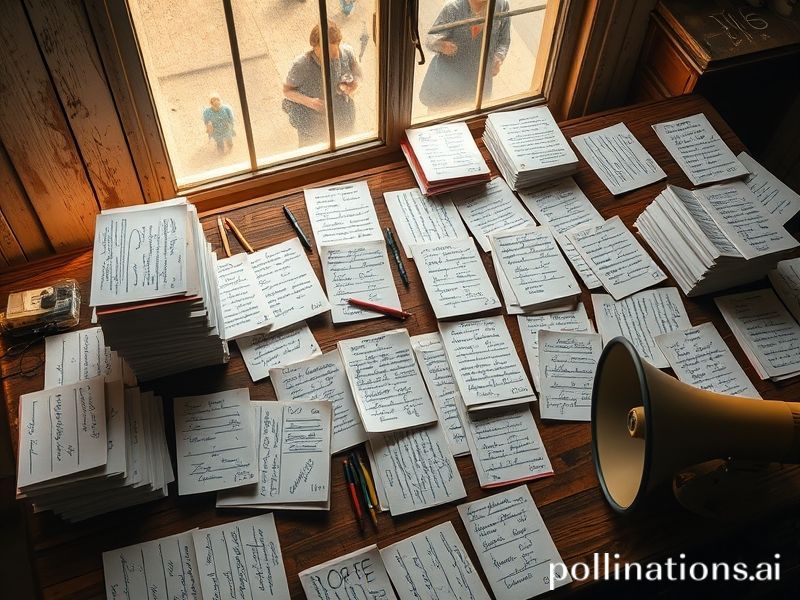The Global Petition: How Millions Click to Save the World (Or Pretend To)
The Petition: A Global Ritual in the Age of Empty Gestures
By “Not Enough Signatures” McAllister, International Affairs Desk
GENEVA—Somewhere between the morning espresso and the 11 a.m. existential crisis, the modern citizen reaches for the last tool of self-respect left in the diplomatic toolkit: the petition. In 2024, this humble scroll of grievances—now pixelated, shareable, and festooned with emojis—has become the Esperanto of global frustration. From Ouagadougou to Oslo, the petition is how we tell the powerful “We see you” while simultaneously admitting we can’t be bothered to leave the sofa.
Consider the numbers. Change.org alone hosts roughly 400,000 active petitions at any given moment, enough digital parchment to girdle the equator twice if printed on the tears of unpaid interns. Last month, 1.2 million Indians signed a petition demanding that their national cricket team stop losing to Australia—a plea as hopeless as asking gravity for a refund. Meanwhile, 300,000 Swedes politely requested that NATO stop rehearsing nuclear war in their backyard, phrasing it in the sort of courteous Nordic legalese that translates roughly to “Kindly desist from annihilating us, with thanks.”
The petition has evolved into a kind of global confessional booth. In Argentina, fans petitioned FIFA to replay the 2022 World Cup final “because France looked suspiciously hydrated.” In Nigeria, 80,000 citizens demanded the return of a politician who absconded with the national budget and a fleet of armored Rolls-Royces—proving that hope springs eternal or irony is simply dead. Even in North Korea, where the internet is rationed like gluten-free bread in a gulag, state media reported a spontaneous petition of 25 million citizens begging the Supreme Leader to accept another medal. One imagines the signatures were pre-printed, like the warranty on a Kalashnikov.
What unites these disparate causes is not logic but ritual. Signing a petition is the 21st-century equivalent of throwing salt over your shoulder: a low-cost superstition that wards off powerlessness. It gives the illusion of steering the supertanker of geopolitics with a plastic spoon. And because every click generates the same dopamine hit as a TikTok cat video, the petition doubles as entertainment. You get to feel righteous for the price of a thumb twitch—cheaper than a Netflix subscription and with better plot twists.
Naturally, regimes have adapted. The Chinese government now offers its own petition portal, “People’s Voice,” which helpfully deletes your complaint before you finish typing it—an efficiency gain Western bureaucracies can only dream of. In Russia, petitioners are invited to a “public consultation” in an unmarked Lada, after which their concerns are either resolved or accidentally locked inside the trunk. Even democracies have refined the art of benign neglect: the UK Parliament promises to “consider” any petition above 100,000 signatures, which is parliamentary Latin for “shred quietly.”
Yet dismissing petitions as mere virtue-signalling misses the darker utility. They are the canaries that refuse to die in our coal mine. When 5 million Iranians sign against mandatory hijab, or 2 million Brazilians protest deforestation, the signatures map the pressure points beneath the surface calm. Authoritarians monitor them like cardiologists reading EKGs, wondering when to raise the voltage. Corporations, ever tone-deaf, commission sentiment analysis to see if the anger can be rebranded as a marketing opportunity. (“Petition to Save the Rainforest—sponsored by an oil company near you!”)
And so the petition persists, a paradox wrapped in pixelated sincerity. It is both weapon and pacifier, scream and whisper, the last flicker of civic muscle before we sink back into the couch cushions. In that sense, the petition is the perfect artifact of our age: globally connected, instantly forgotten, and statistically doomed—yet still stubbornly signed.
Because if we stop clicking, we might have to admit that the only signature that ever truly mattered was our own, on the unwritten contract that says: “Yes, this circus may continue.” And that, dear reader, is a petition nobody wants to circulate.







